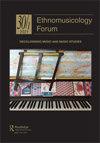在意大利的非洲寻求庇护者的音乐恢复策略:文化调解人巴瓦·萨利夫
IF 0.2
1区 艺术学
0 MUSIC
引用次数: 0
摘要
摘要本文探讨了音乐对意大利非洲寻求庇护者的福祉、身份认同和文化融合的贡献,在这种背景下,意大利多数人往往对移民怀有敌意,否认多元文化。作为一个致力于提高跨文化理解的更广泛的长期行动项目的一部分,本案例研究聚焦于一位音乐家巴瓦·萨利夫的生活故事和倡议。该片讲述了萨利夫从加纳前往意大利的非正常移民身份,到他在意大利担任寻求庇护者的文化调解员,以及2015年音乐项目Oghene Damba:Cremona Boys musical Theater的创始人。强调了对萨利夫足够了解以讨论他的个人经历的敏感性;这是在记录了四年Oghene Damba的表演之后才有可能实现的。还讨论了其他民族志互动策略,包括共同观看和评论Oghene Damba的录音和YouTube视频。尽管对寻求庇护者施加了限制,但Salifu的各种音乐倡议和合作揭示了音乐的潜力,让他们迷失方向的生活有意义,并朝着被意大利社会接受的方向迈出步伐。本文章由计算机程序翻译,如有差异,请以英文原文为准。
Musical resilience strategies for African asylum seekers in Italy: the cultural mediator Bawa Salifu
ABSTRACT This article examines music’s contribution to the wellbeing, identity affirmation, and cultural integration of African asylum seekers in Italy, in a context where the Italian majority is often hostile to migrants and denies multiculturalism. As part of a broader long-term action-based project dedicated to improving intercultural understandings, this case study focuses on the life story and initiatives of a single musician: Bawa Salifu. It follows Salifu from his status as an irregular migrant, who travelled to Italy from Ghana, to his role as a cultural mediator for asylum seekers in Italy and as the founder in 2015 of the musical project Oghene Damba: Cremona Boys Musical Theater. The sensitivities surrounding getting to know Salifu well enough to discuss his personal experiences are highlighted; this was only possible after documenting Oghene Damba performances for four years. Other ethnographic interaction strategies are also discussed, including jointly watching and commenting on Oghene Damba recordings and YouTube videos. Despite the limitations imposed on asylum seekers, Salifu’s various musical initiatives and collaborations reveal the potential of music to give meaning to their disorientated lives and to make steps towards acceptance into Italian society.
求助全文
通过发布文献求助,成功后即可免费获取论文全文。
去求助
来源期刊

Ethnomusicology Forum
MUSIC-
CiteScore
1.10
自引率
25.00%
发文量
29
期刊介绍:
Articles often emphasise first-hand, sustained engagement with people as music makers, taking the form of ethnographic writing following one or more periods of fieldwork. Typically, ethnographies aim for a broad assessment of the processes and contexts through and within which music is imagined, discussed and made. Ethnography may be synthesised with a variety of analytical, historical and other methodologies, often entering into dialogue with other disciplinary areas such as music psychology, music education, historical musicology, performance studies, critical theory, dance, folklore and linguistics. The field is therefore characterised by its breadth in theory and method, its interdisciplinary nature and its global perspective.
 求助内容:
求助内容: 应助结果提醒方式:
应助结果提醒方式:


